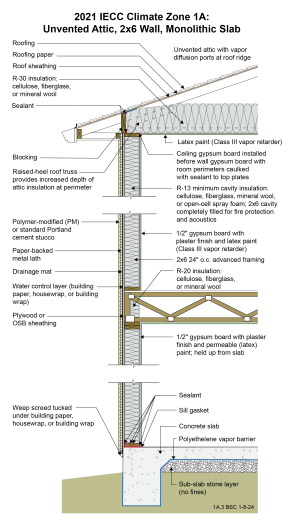Notes
Drawing 1A.3: IECC CZ 1A: Unvented Attic, 2x6 Wall, Monolithic Slab
- The attic insulation in this unvented attic is located on the attic floor. The moisture in the attic space is controlled by vapor diffusion ports, not with attic venting. Unvented attics are more resistant to wind uplift under hurricane conditions.
- A drainage mat is provided behind the stucco layer installed over the frame wall to control hydrostatic pressure. This assembly is drained to the exterior at a weep screed located at the bottom of the wood framing. The stucco layer should not be extended into the ground in order to control wicking and insect entry.
- The wall is framed with 2x6 24” o.c. advanced framing as it uses less board footage (volume of wood framing) than standard 2x4 16” o.c. framing and has therefore been shown to be less expensive in material cost. It has also been proven to be less expensive in labor (25% fewer framing members) and is faster to assemble. Although the code allows for 2x4 framing and lower R-value cavity insulation the use of advanced framing and the associated cost savings can more than offset the increase in the cost of cavity insulation (this of course depends on relative price fluctuations in labor and materials).
- Although the minimum R-value of the insulation in this wall is R-13 per IECC, fire code may require the entire cavity to be filled, likely resulting in a higher R-value for a 2x6 wall.
- Avoid vinyl wallpaper and oil-based paint or coatings in Climate Zone 1A. These wall coverings are vapor impermeable and increase the risk of condensation within the wall.
- The entire monolithic concrete slab should have a polyethylene vapor barrier wrapping the underside of the thickened slab edge to control capillary uptake. The polyethylene should extend upward from the bottom of the monolithic slab to grade on the exterior.
